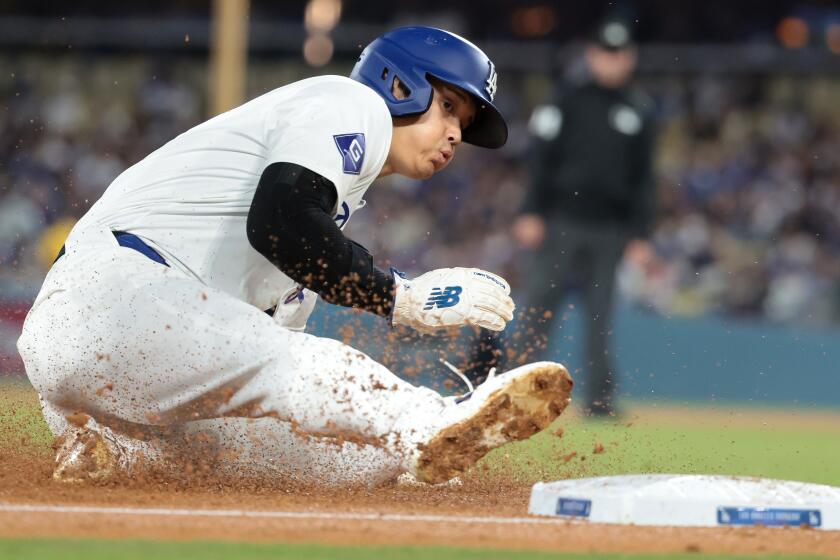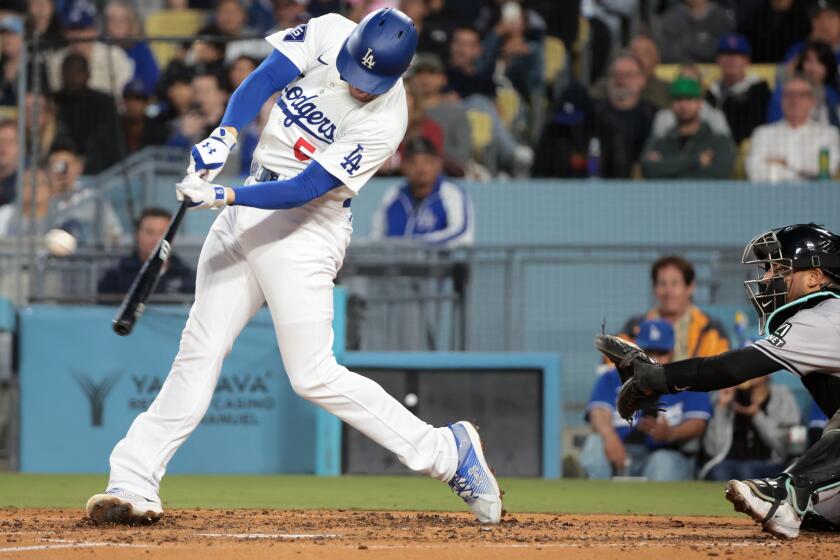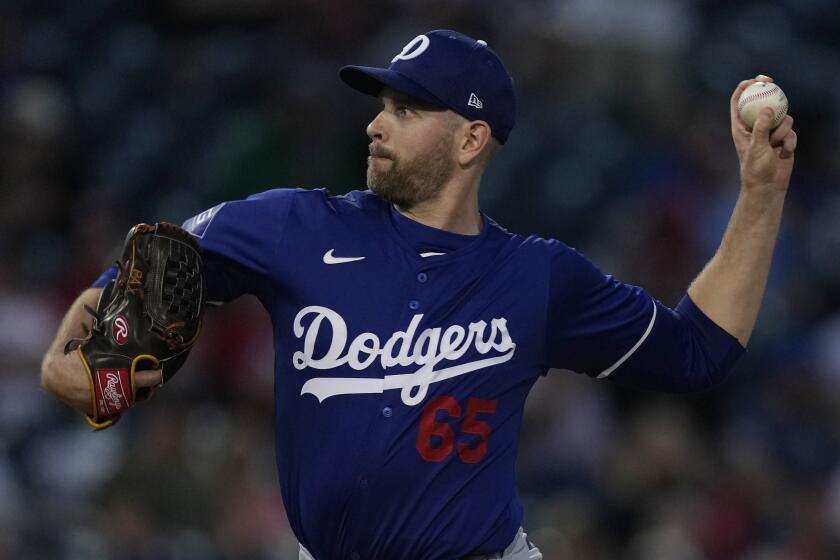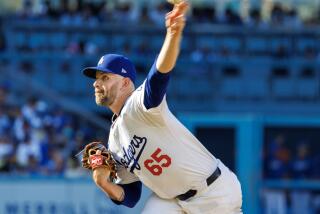Dodgers’ James Paxton has found success despite missing a key ingredient
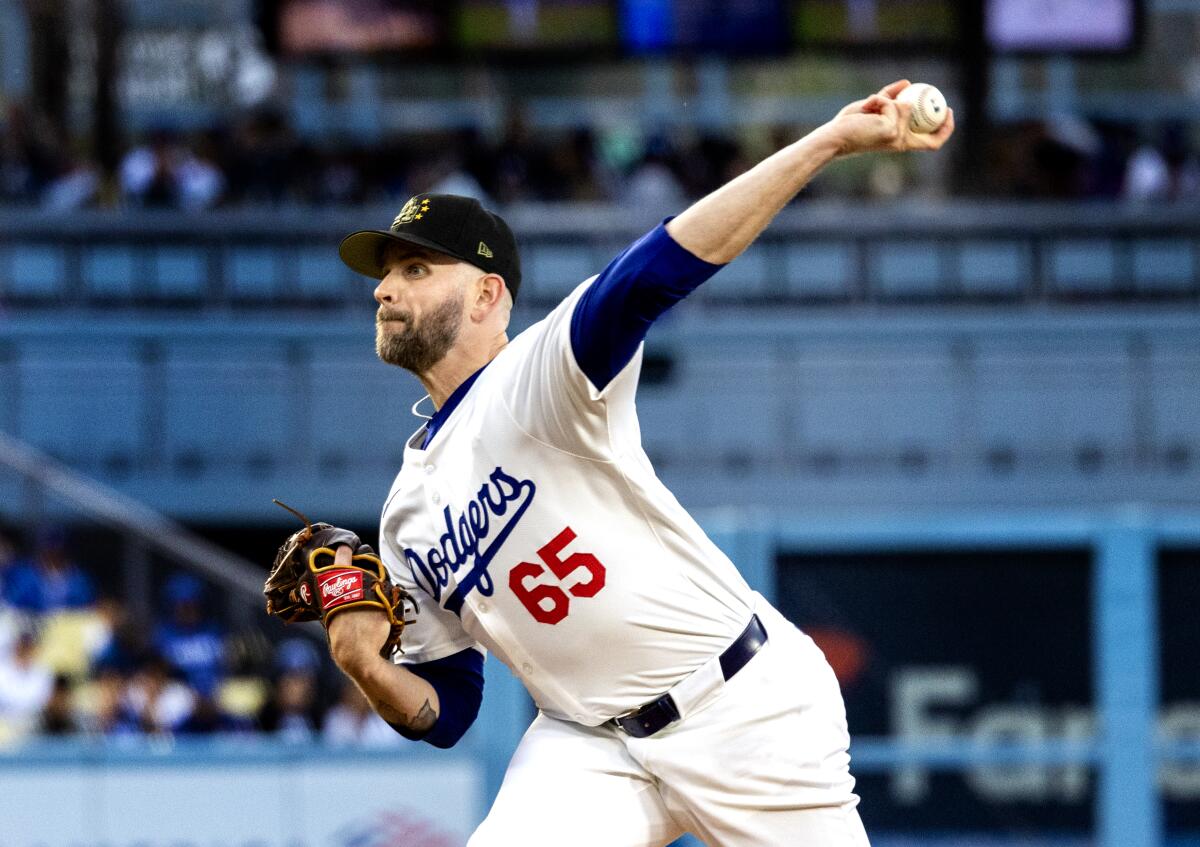
James Paxton will take a 5-0 record and 2.84 ERA into his start Friday night at Cincinnati, which is pretty remarkable considering the Dodgers left-hander walked as many batters (24) as he struck out (24) in 44⅓ innings of his first eight games and is ready to send out a search party for one of his best secondary pitches.
“I don’t really know where it is,” Paxton said of his cut-fastball, an essential part of his three-pitch repertoire for most of his 11-year career until this season. “I’m trying to figure it out. We’re playing catch with it, throwing it in the bullpen and stuff like that, and I just haven’t been able to find it yet.”
A lively four-seam fastball that averaged 97.5 mph at its peak in 2016 has always been Paxton’s best pitch, one he’s thrown 62% of the time throughout his career, and he has complemented his heater with a knuckle-curve that he’s thrown 19% of the time and the cutter, which he’s thrown 13% of the time.
But during a four-year stretch from 2016-19, Paxton threw his cutter, which was clocked between 89 and 91 mph, almost as much as his curve, holding opponents to a .196 average (87 for 444) with 200 strikeouts in at-bats ending with the cutter.
Even in his first season after Tommy John surgery, with the Boston Red Sox in 2023, Paxton had enough confidence in a diminished cutter that averaged 85.8 mph to throw it 16.5% of the time, holding batters to a .191 average (13 for 68) with 26 strikeouts in at-bats ending with the pitch.
Paxton, who signed a one-year, $7-million deal with the Dodgers in January, threw his curve 19.5% of the time last season, holding hitters to a .231 average (15 for 65) and 23 strikeouts in at-bats ending with the pitch.
Shohei Ohtani has two hits and two stolen bases, but most of the team has an off night in loss to Diamondbacks.
But the cutter has been left on the cutting-room floor for most of 2024, Paxton throwing the pitch only 42 times (5.7%). He’s thrown 458 fastballs (62.4%) and 191 curves (26%) and even leaned on a seldom-used changeup in a 5-1 victory over the Atlanta Braves on May 5, throwing that pitch 12 times.
“I think it goes to show how special of a delivery he has with the deception of the throw,” assistant pitching coach Connor McGuiness said of Paxton’s ability to survive — and often thrive — with only two pitches for much of the season.
“When he’s pumping fastballs in there at 97-98 mph, quite honestly, any off-speed pitch with his delivery is going to work,” McGuiness said. “He’s found great success with that curveball this year, and I think that cutter is going to come along once that power really starts to get back.”
That’s the crux of the problem for Paxton, whose cutter has fallen victim to a loss of fastball velocity since his elbow ligament replacement procedure in 2021. Paxton’s four-seamer has averaged just 93.5 mph this season, and his cutter has averaged just 84.2 mph, well off its peak of 90.3 mph in 2016.
“I think pre-Tommy John, I used it quite a bit. It was a big swing-and-miss pitch for me,” Paxton, 35, said of the cutter. “But I haven’t really had it since surgery. It’s not as hard. I was throwing it 89-91 mph before. Now, it’s like 85 mph. And the movement is just not quite as sharp as it was.”
Freddie Freeman hasn’t been bad, hitting .298. But he hasn’t been great either, making him almost a forgotten man in a lineup that includes Shohei Ohtani and Mookie Betts.
Neither Paxton nor the Dodgers have given up on the pitch. Paxton has been working in bullpen sessions between starts to fine-tune his delivery and is long-tossing more in an effort to increase his arm strength, and if he can bump the velocity of his fastball a bit, his cutter should improve.
“The focus for him has been trying to get the delivery dialed in and to get some more athleticism back in the throw, because some of the general execution of the fastball hasn’t been where he wants it to be,” McGuiness said. “But when he gets to a point where he’s throwing the velocity that he wants, then that cutter will come into play.”
The loss of his cutter was the least of Paxton’s concerns in April. Command of all of his pitches was a bigger issue, Paxton going 3-0 with a 3.51 ERA in five starts despite walking 22 batters and striking out 15 batters in 25 ⅔ innings.
But Paxton found some better rhythm in his delivery during a bullpen workout in early May, and he did not walk a batter in his last two starts, giving up four hits and striking out four in six shutout innings of a 5-0 win at San Diego on May 11 and giving up three runs and seven hits and striking out two in a 7-3 win over the Reds last Friday night.
“I think the most impressive thing is that he uncharacteristically has walked a lot of guys, and he’s been able to weather those baserunners and still make pitches to limit the damage and not get overly frustrated to where he costs us a start,” manager Dave Roberts said. “That just speaks to experience and maturity.”
The Dodgers took a flier this offseason on James Paxton, who struggled at the end of last summer, and he showed some promise in his first spring start.
That maturity — and patience — McGuiness said, has also allowed Paxton to keep any frustration about the loss of his cutter in check.
“He’s just a gamer, man,” McGuiness said. “I mean, he went out there for a few starts with just a fastball, and he was still able to go deep into the game and give our offense a chance to put up some runs and win.
“He’s been able to kind of reinvent himself for now until he really gets to the point where he feels like the delivery is locked in and that fastball velocity is there. When that happens, I’m willing to bet that cutter is gonna be right there, too. … We’re excited about him moving forward, because we feel like the best is yet to come.”
More to Read
Are you a true-blue fan?
Get our Dodgers Dugout newsletter for insights, news and much more.
You may occasionally receive promotional content from the Los Angeles Times.

